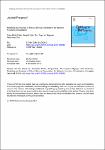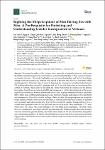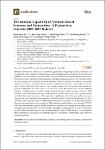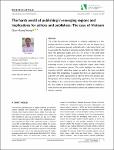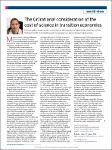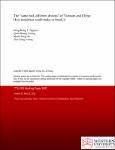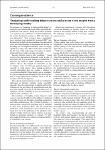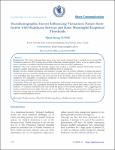Kết quả tìm kiếm từ 1 đến 10 trong 39 kết quả
This short article represents the first attempt to define a new core cultural value that will enable engaging the business sector in humankind’s mission to heal nature. First, I start with defining the problem of the current business culture and the extant thinking on how to solve environmental problems, which I called “the eco-deficit culture.” Then, I present a solution to this problem by formulating the “semiconducting principle” of monetary and environmental values exchange, which I believe can generate “an eco-surplus business culture.” This work adds one new element, the eleventh cultural value, to the ten core values of progressive cultures postulated by Harrison (2000). |
Logically, and by most common standards, academics would be pleased to be cited, considering it a form of recognition of their intellect. In return, especially those with high citation counts, such as Clarivate Analytics’ Highly Cited Researchers, can benefit through peer recognition, rewards, funding, securing a better position, or expanding a collaborative network. Despite known and untold benefits, one issue has not been discussed: the right to refuse to be cited or the right to refuse a citation. Academics might not want to be cited by papers published in truly predatory journals, papers with false authors, or sting papers with falsified elements that employ underhanded ethical ta... |
International collaboration contributes significantly to improving scientific performance in Vietnam, but it also results in Vietnamese researchers depending on foreign partners to get their work published. The current study is an initial effort to examine the domestic research capability of Vietnam’s Social Science and Humanities (SSH) disciplines through scientific productivity. The research focuses on investigating various aspects, including leading Vietnamese authors, solo authors, and gender difference, as well as international and domestic collaboration networks. The study extracts the data of 2040 Vietnamese SSH authors, 1981 foreign authors, and 3160 publications during the pe... |
Vietnam–China relations could be captured in the Chinese expression ‘同床异梦’, ‘same bed, different dreams’. Analysing Vietnam–China’s asymmetric relationship, cultural and political similarities, divergences in global ambition and the involvement of foreign powers, this study shows how the relationship is increasingly interdependent but is equally fragile. One possible cause is the low level of trust on both sides, evidenced by repeated calls to ‘consolidate political trust’ or ‘enhance mutual trust’ in their high-level bilateral dialogues. |
Background: This short communication report some new results obtained from a medical survey among 900 Vietnamese patients in 2015, looking into possibly influential sociodemographic factors as far as patient satisfaction is concerned, to establish empirical relationships between them for policy implications.
Methods: The study employed the baseline category logit models to establish empirical relationships between predictor variables and responses, which reflect different levels of satisfaction.
Results: Income, medical expenditure, and insurance coverage have the positive influence on improving patient satisfaction. However, insurance reimbursement rate has the negative influen... |
Showing results [1 - 10] / 39
This short article represents the first attempt to define a new core cultural value that will enable engaging the business sector in humankind’s mission to heal nature. First, I start with defining the problem of the current business culture and the extant thinking on how to solve environmental problems, which I called “the eco-deficit culture.” Then, I present a solution to this problem by formulating the “semiconducting principle” of monetary and environmental values exchange, which I believe can generate “an eco-surplus business culture.” This work adds one new element, the eleventh cultural value, to the ten core values of progressive cultures postulated by Harrison (2000). |
Logically, and by most common standards, academics would be pleased to be cited, considering it a form of recognition of their intellect. In return, especially those with high citation counts, such as Clarivate Analytics’ Highly Cited Researchers, can benefit through peer recognition, rewards, funding, securing a better position, or expanding a collaborative network. Despite known and untold benefits, one issue has not been discussed: the right to refuse to be cited or the right to refuse a citation. Academics might not want to be cited by papers published in truly predatory journals, papers with false authors, or sting papers with falsified elements that employ underhanded ethical ta... |
International collaboration contributes significantly to improving scientific performance in Vietnam, but it also results in Vietnamese researchers depending on foreign partners to get their work published. The current study is an initial effort to examine the domestic research capability of Vietnam’s Social Science and Humanities (SSH) disciplines through scientific productivity. The research focuses on investigating various aspects, including leading Vietnamese authors, solo authors, and gender difference, as well as international and domestic collaboration networks. The study extracts the data of 2040 Vietnamese SSH authors, 1981 foreign authors, and 3160 publications during the pe... |
Vietnam–China relations could be captured in the Chinese expression ‘同床异梦’, ‘same bed, different dreams’. Analysing Vietnam–China’s asymmetric relationship, cultural and political similarities, divergences in global ambition and the involvement of foreign powers, this study shows how the relationship is increasingly interdependent but is equally fragile. One possible cause is the low level of trust on both sides, evidenced by repeated calls to ‘consolidate political trust’ or ‘enhance mutual trust’ in their high-level bilateral dialogues. |
Background: This short communication report some new results obtained from a medical survey among 900 Vietnamese patients in 2015, looking into possibly influential sociodemographic factors as far as patient satisfaction is concerned, to establish empirical relationships between them for policy implications.
Methods: The study employed the baseline category logit models to establish empirical relationships between predictor variables and responses, which reflect different levels of satisfaction.
Results: Income, medical expenditure, and insurance coverage have the positive influence on improving patient satisfaction. However, insurance reimbursement rate has the negative influen... |

